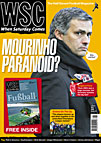 Steve Menary sees that teams on the continent could learn a great deal from the systems of fans' trusts we now have in the UK
Steve Menary sees that teams on the continent could learn a great deal from the systems of fans' trusts we now have in the UK
The fans’ trust movement has so far been just a British phenomenon, but may not be so for long, if an investigation by the European Union into how football is run concludes that the continent can learn from the UK model.
Since Northampton Town fans set up the first trust in 1992, another 128 trusts have been formed in Britain aided by Supporters Direct (SD), the state-funded quango championed by Sports Minister Richard Caborn. He was also instrumental in persuading UEFA and the EU to agree to a major review of how European football operates (see WSC 228). As part of this, José Luis Arnaut, a former sports minister in Portugal who is leading the review, will look into whether the trust idea can be rolled out. SD deputy chief executive Dave Boyle says: “There is G-14 for the big clubs, FIFPRO for the players, UEFA for the associations and nothing for the fans.”
As UEFA advocated fan ownership in their recent manifesto, Vision Europe, the idea is on the agenda, but is it realistic? The concept is gradually spreading. The 13 British clubs now owned by fans are lower-league sides such as Brentford, Chesterfield and Stockport County, but a first trust is being formed in Northern Ireland. Glentoran fans set up the “Rest in East” campaign to keep their team in east Belfast after the directors sold the stadium in 2003. Glentoran’s gates average around 1,800, but 417 attended a meeting in November on whether to set up a trust and all voted “yes”.
Graeme Moore of Rest in East, who are working with the Co-operative Society and SD, insists this ratio of trust members to fan base is vital. The minimum donation will be £20 and, though Rest in East wants big backers, it will be one member, one vote. Moore says: “We want to raise nothing less than £20,000 a year, but we’re hoping for an awful lot more.”
Trusts in mainland Britain stepped into a void created by financial problems at their clubs, which are nearly all limited companies. With no predecessors in Ulster, Rest in East had to submit a template for a fans’ trust to Companies House in Northern Ireland.
Ownership structures differ elsewhere in Europe, but a conference on the movement was held on March 25 in the Republic of Ireland. The fans’ trust at Eircom Premier League side Bohemians hosted the event, attended by trusts from Sligo Rovers, Galway United and Dundalk, and a Rest in East contingent.
In Spain, Osasuna and Real Sociedad are fan-owned, with elected boards. So are Barcelona, conversely also a G-14 member, but the ownership model that could help spread the trust movement may be in Germany.
Bayer Leverkusen and VfL Wolfsburg are owned by drugs giant Bayer and Volkswagen respectively as they grew out of the companies but, under German FA rules, the rest of the clubs in the Bundesliga’s two divisions and the third Regionalliga tier are companies with a 51 per cent stake held by fans.
A good model for trusts, perhaps, but one that has suppressed interest in the trust concept and many fans are not even club members, according to Martin Endemann of Germany’s Alliance of Active Football Fans. He says: “Many clubs still have an ear to what fans are demanding so the need to take over a club isn’t much seen here. Some clubs have fan participation on the boards made possible by annual elections so someone of yours sits there to have an eye on how the clubs run.”
SD have been in contact with German fans and embryonic trusts in the Czech Republic, Norway, Belgium, Switzerland, Australia and Israel, but the biggest step towards embracing the concept in mainland Europe is in Greece.As usual, this was precipitated by a crisis, with AEK Athens accumulating debts of about £112 million, which nearly sank the club.
Named after the year AEK was formed, the Union 1924 trust used Northampton as an inspiration to try to buy shares in the club.Using Greek company law, AEK recently cut their debts to a more manageable £16m. Despite this, Union 1924 are persisting in their aspirations and wants to inspire fans across Europe and new fans’ trusts at the PAOK and ARIS clubs from Salonika in northern Greece. Whether this enthusiasm is shared by Arnaut in his final report remains to be seen.
From WSC 231 May 2006. What was happening this month